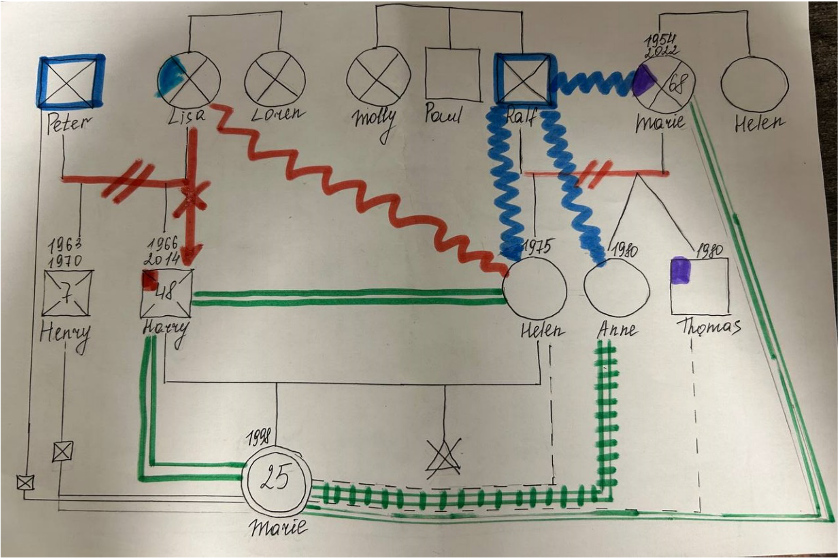Introduction
Genogram assessment is one way to understand family relationships and can be used in family and couples’ therapy. In addition, it identifies physical and mental diseases that may be hereditary. One of the goals of creating a genogram is to collect information about the patient, which can be used in further therapy. This paper will analyze Marie’s genogram to help develop strategies for additional family counseling.
Genogram Summary

The master key of the genogram is Marie, female, 25 years old. Her parents, Harry and Helen, had a good close relationship. Helen was pregnant twice during the marriage, but one of the pregnancies ended in a miscarriage. Marie’s father, Harry, died in 2014 when the girl was 16 from a heart condition. An important factor is that the patient had a close and trusting relationship with her father, while the relationship with her mother is distant.
Marie has a very close relationship with her aunt Anne and grandmother Marie. With relatives from the father’s side, the patient never met or did not have close relationships. At the same time, all relatives from Harry’s side, including Marie’s grandparents, Peter and Lisa, are already dead. The patient’s grandparents were divorced because Grandpa Peter was an alcoholic. Marie’s grandmother Lisa had Alzheimer’s disease at an older age. In addition, Lisa manipulated her son Harry and had a negative attitude toward Helen. However, Lisa’s manipulation did not affect the relationship between Marie’s parents.
Marie’s maternal grandparents, Ralf and Marie, are divorced due to the patient’s grandfather’s alcoholism. Ralf abused his wife, Marie, and his daughters, Helen and Anne, which could have affected their social interaction skills. In addition, grandmother Marie and uncle Thomas have diabetes, which may predispose the patient to this disease. Of the relatives on Helen’s side, to date, Marie maintains a close relationship only with aunt Anne, while relationships with other relatives are distant or non-existent.
Usefulness of Genogram Assessment
The genogram is of great importance for getting to know the patient, which is a master key of the genogram since it allows you to collect detailed information about relatives and family relationships. Its assessment helps to gather detailed information about the patient, see weaknesses in family relationships, and develop treatment strategies for the patient (Capuzzi & Stauffer, 2021). An evaluation of Marie’s genogram showed the presence of traumatic life experiences, heredity of psychiatric and physical diseases, and relationships and emotional attachments in the family.
The genogram “can improve insight and inform therapy” so that work with the patient is not based on assumptions from the counselor. (Eshtehardi & Gasbarrini, 2019, p. 1285). For example, Marie had a close relationship with her father but not with her mother. In the course of therapy, it is necessary to find out whether the relationship with Helen was always distant or deteriorated at a certain point, for example, after the death of Harry. Quite remarkable is that Marie has very close relationships with Anne but not with Helen. In addition, the patient had a close relationship with her grandmother, and her death was a traumatic event that could negatively affect Marie’s psychological state. Based on this data, a couples therapy strategy can be developed for Marie and Helen to improve their relationship. In addition, it must be taken into account that Helen had a miscarriage and was abused by her father, because of which some topics may be quite sensitive for her.
Moreover, the genogram shows the diseases that were in the Marie family. Because there has been diabetes on the mother’s side for two generations, it is necessary to recommend the patient undergo a medical examination for this disease. In addition, hereditary health problems in Marie’s family include heart disease and Alzheimer’s, which is why the patient should carefully monitor her health and undergo regular medical examinations.
Another significant factor in assessing the genogram is culture. Cultural issues affect family relationships and the counseling process by considering what information is culturally sensitive to the patient (Shellenberger et al., 2007). Mary’s family never immigrated, and the patient was raised in the same culture. However, therapy must consider the possible generation gap between Marie and her mother, Helen, which may cause cultural divergence and misunderstanding.
Understanding the genogram has a significant positive impact on the counselor’s work and the improvement of the relationship with the patient. In Marie’s case, the genogram assessment helped identify strengths and weaknesses in family communication. For example, Marie and Helen had a good relationship with Harry, but they don’t get along. Therefore, the distant relationship between mother and daughter is a weak point requiring more careful analysis. In addition, genogram evaluation helps to tailor counseling individually based on the patient’s needs.
References
Capuzzi, D., & Stauffer, M. D. (2021). Foundations of couples, marriage, and family counseling.
Wiley Eshtehardi, K.K., & Gasbarrini, M.F. (2019). Genogram in Couple and Family Therapy. In: Lebow, J.L., Chambers, A.L., Breunlin, D.C. (eds) Encyclopedia of Couple and Family Therapy (pp.1281. Springer, Cham. Web.
Shellenberger, S., Dent, M. M., Davis-Smith, M., Seale, J. P., Weintraut, R., & Wright, T. (2007). Cultural genogram: A tool for teaching and practice. Families, Systems, & Health, 25(4), 367–381. Web.